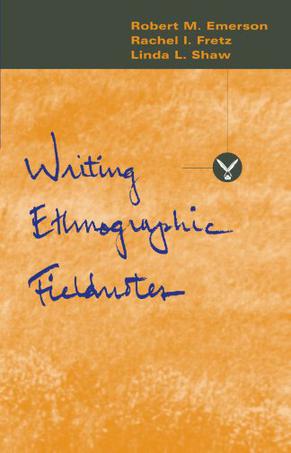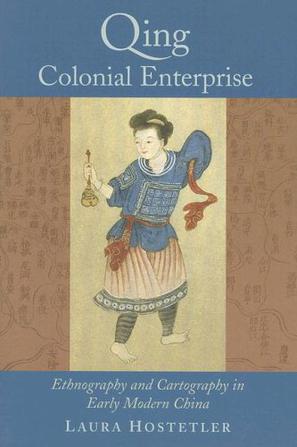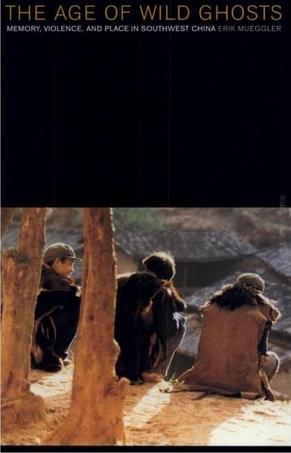欢迎来到相识电子书!
标签:ethnography
-
Writing Ethnographic Fieldnotes
In this companion volume to John van Maanen's "Tales of the Field", three scholars reveal how the ethnographer turns direct experience and observation into written fieldnotes upon which an ethnography is based. Drawing on years of teaching and field research experience, the authors develop a series of guidelines, suggestions and practical advice about how to write useful fieldnotes in a variety of settings, both cultural and institutional. Using actual, unfinished "working" notes as examples, they illustrate options for composing, reviewing and working fieldnotes into finished texts. They discuss different organizational and descriptive strategies, including evocation of sensory detail, synthesis of complete scenes, the value of partial versus omniscient perspectives and of first-person versus third-person accounts. Of particular interest is the authors' discussion of notetaking as a mindset. They show how transforming direct observations into vivid descriptions results not simply from good memory but more crucially from learning to envision scenes as written. A good ethnographer, they argue, must learn to remember dialogue and movement like an actor, to see colours and shapes like a painter, and to sense moods and rhythms like a poet. The authors also emphasize the ethnographer's core interest in presenting the perceptions and meanings which the people studied attach to their own actions. They demonstrate the subtle ways that writers can make the voices of people heard in the texts they produce. Finally, they analyze the "processing" of fieldnotes - the practice of coding notes to identify themes and methods for selecting and weaving together fieldnote excerpts to write a polished ethnography. This book, however, is more than a "how-to" manual. The authors examine writing fieldnotes as an interactive and interpretive process in which the researcher's own commitments and relationships with those in the field inevitably shape the character and content of those fieldnotes. They explore the conscious and unconscious writing choices that produce fieldnote accounts. And they show how the character and content of these fieldnotes inevitably influence the arguments and analyses the ethnographer can make in the final ethnographic tale. This book shows that note-taking is a craft that can be taught. Along with "Tales of the Field" and George Marcus and Michael Fisher's "Anthropology as Cultural Criticism", "Writing Ethnographic Fieldnotes" should provide an essential tool for students and social scientists alike. -
Only Hope
The first generation of children born under China’s one-child family policy is now reaching adulthood. What are these children like? What are their values, goals, and interests? What kinds of relationships do they have with their families? This is the first in-depth study to analyze what it is like to grow up as the state-appointed vanguard of modernization. Based on surveys and ethnographic research in China, where the author lived with teenage only children and observed their homes and classrooms for 27 months between 1997 and 2002, the book explores the social, economic, and psychological consequences of the government’s decision to accelerate the fertility transition. Only Hope shows how the one-child policy has largely succeeded in its goals, but with unintended consequences. Only children are expected to be the primary providers of support and care for their retired parents, grandparents, and parents-in-law, and only a very lucrative position will allow them to provide for so many dependents. Many only children aspire to elite status even though few can attain it, and such aspirations lead to increased stress and competition, as well as intense parental involvement. -
美国的社会与个人
《美国的社会与个人:加州悠然城社会生活的民族志》内容简介:作者扎根美国加州一个普通小镇一年,聚焦家庭生活中爱的表达、家庭主妇、家庭学校、婚姻关系、代际关系和居住模式等内容,以民族志的形式表明当代美国中产阶级的家庭体现出两个重要主题:首先,家庭是独立的私人领域,与外部世界之间存在着明晰的边界。其次,作为私人领域的家庭内部留有个人的私人空间。家庭体现“边界”也生产“边界”。 -
Liquidated
From Publishers Weekly The timely question, What caused the current global financial crisis? provokes answers usually aimed at the level of institutions and the more abstract market logic. Ho's refreshing ethnography of the daily lives of Wall Street investment bankers takes another tack and outlines a web of practices, beliefs and structures that may be vital to understanding what keeps the market system in place despite built-in instabilities. Ho, a former business analyst and now an associate professor of anthropology at the University of Minnesota, unpacks constant downsizing, high risk/high reward job liquidity, shortsighted compensation structures, prestige and the ruse of shareholder value. Her keen eye for the significance of space illuminates workplace narratives, e.g., segregating staff by floor, function and prestige; constant and lavish recruiting events at Princeton and Harvard; and anticlimactically tawdry office space for most workers. The author exposes how elite undergraduates are immersed in a culture promoting finance as the only legitimate job, how educational pedigrees reinforce the financial world's self-image—while the actual jobs remain rigidly hierarchical (stratifying women, people of color and non–Ivy League graduates), highly unstable and isolating, encouraging a culture in which making money is the only value. (Aug.) Copyright © Reed Business Information, a division of Reed Elsevier Inc. All rights reserved. Review "We're pretty familiar with the economic rationale for the regime of cost-cutting and downsizing throughout corporate America in recent decades. But Karen Ho's research greatly enriches our understanding of how Wall Street's own peculiar culture of transient relationships and relentless competition has contributed to the shareholder revolution. And, along the way, her interviews and fieldwork offer a very revealing picture of the mind of Wall Street. A fascinating and important book." Doug Henwood, editor of Left Business Observer " Karen Ho has picked an excellent time to publish her fascinating new study...patient ethnographic analysis has produced a fascinating portrait that will be refreshingly novel to most bankers...Ho peppers her account with revealing eyewitness stories...Most fascinating of all is her account of how Wall Street becomes deluded by its own rhetoric about "market efficiency"...I, for one, would vote that Ho's account becomes mandatory reading on any MBA (or investment banking course); if nothing else, it might be more entertaining than the other texts that bankers swallow so uncritically." Gillian Tett, Financial Times, 2nd October 2009 -
Qing Colonial Enterprise
In Qing Colonial Enterprise, Laura Hostetler shows how Qing China (1636-1911) used cartography and ethnography to pursue its imperial ambitions. She argues that far from being on the periphery of developments in the early modern period, Qing China both participated in and helped shape the new emphasis on empirical scientific knowledge that was simultaneously transforming Europe--and its colonial empires--at the time. Although mapping in China is almost as old as Chinese civilization itself, the Qing insistence on accurate, to-scale maps of their territory was a new response to the difficulties of administering a vast and growing empire. Likewise, direct observation became increasingly important to Qing ethnographic writings, such as the illustrated manuscripts known as "Miao albums" (from which twenty color paintings are reproduced in this book). These were intended to educate Qing officials about various non-Han peoples so that they could govern these groups more effectively.Hostetler's groundbreaking account will interest anyone studying the history of the early modern period and colonialism. -
The Age of Wild Ghosts
In Erik Mueggler's powerful and imaginative ethnography, a rural minority community in the mountains of Southwest China struggles to find its place at the end of a century of violence and at the margins of a nation-state. Here, people describe the present age, beginning with the Great Leap Famine of 1958-1960 and continuing through the 1990s, as "the age of wild ghosts." Their stories of this age converge on a dream of community--a bad dream, embodied in the life, death, and reawakening of a single institution: a rotating headman-ship system that expired violently under the Maoist regime. Displaying a sensitive understanding of both Chinese and the Tibeto-Burman language spoken in this region, Mueggler explores memories of this institution, including the rituals and poetics that once surrounded it and the bitter conflicts that now haunt it.To exorcise "wild ghosts," he shows, is nothing less than to imagine the state and its power, to trace the responsibility for violence to its morally ambiguous origins, and to enunciate calls for justice and articulate longings for reconciliation.
热门标签
下载排行榜
- 1 梦的解析:最佳译本
- 2 李鸿章全传
- 3 淡定的智慧
- 4 心理操控术
- 5 哈佛口才课
- 6 俗世奇人
- 7 日瓦戈医生
- 8 笑死你的逻辑学
- 9 历史老师没教过的历史
- 10 1分钟和陌生人成为朋友






